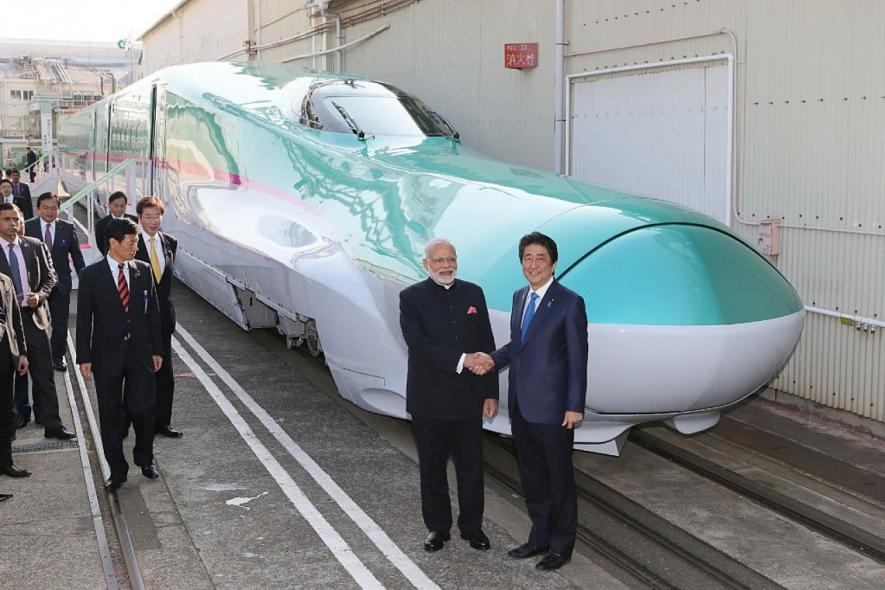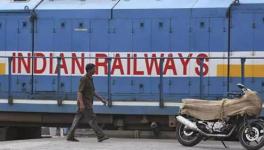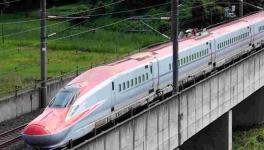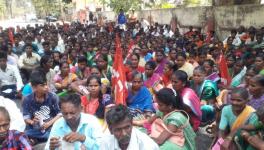Farmers In Central Gujarat Continue Protests Against Bullet Train Land Acquisition

As farmers and residents of the areas affected by the Mumbai-Ahmedabad Bullet Train project continue their struggle in Gujarat and Maharashtra, farmers from central Gujarat began a four-day awareness-raising drive on 22 June.
Protesting against the forceful land acquisition, the farmers under the banner of the Gujarat Khedut Samaj will conclude the awareness campaign on 25 June.
“Starting from Ahmedabad, we will cover 192 affected villages to create awareness about how the bullet train project affect the lives of people and farmers,” said Jayesh Patel, president of Gujarat Khedut Samaj, speaking to Newsclick.
These 192 villages spread across six districts in Gujarat, and with nearly 2,500 families, are among those that will be affected in by the bullet train project.
Read More: Bullet Train: Glamour Project Kicks Off
The Mumbai-Ahmedabad High-Speed Rail Corridor (MAHSRC), a pet project of Prime Minister Narendra Modi, will cost Rs 1.1 lakh crore. It will be constructed with a loan of Rs 88,000 crore from Japan. The 508-km project line will pass through Gujarat, Maharashtra, and Dadra and Nagar Haveli. Of this, 382 km will pass through villages in Gujarat, destroying around 700 hectares of the farming land in the state. The project will take up more than 1,000 hectares of farming land in total.
It is not a question of compensation alone; the farmers do not want to leave their land and livelihood.
“The farmers are not willing to give their fertile land for the bullet train. Our demand is that the land near the western railway track be used for the bullet train project. There is enough space, and as per the feasibility report for the project, it requires the land width of 17.5 metres. Of this, 4 metres is service land. The actual requirement for the bullet train track is 12.5 metres. More than 20-metre land is available on either side of the western railway track. That land should be used instead of the farming land,” Jayesh Patel told Newsclick.
“Apart from this, one dedicated freight corridor track is also being built. They have already acquired the land for this corridor. There is also enough space for the bullet train.”
Patel added, “We are not opposing the bullet train, but we oppose the acquisition of fertile land where they are trying to set up the project. We do not want to give our fertile land for the bullet train.”
Speaking of the Land Acquisition Act 2013, Patel said the Gujarat government had amended it in 2016. “Whatever consent towards social assessment, food security, rehabilitation and resettlement were in the provisions in chapters 2 and 3 of the 2013 Act were bypassed by the Gujarat government. Since it is a multi-state project, the central government is the appropriate authority to implement the procedures and we demand the land acquisition as per the 2013 Act.”
Read More: Farmers in Maharashtra Protest Against Bullet Train Land Acquisition in Palghar
The ongoing struggle in Gujarat by farmers to protect their livelihoods is not an isolated one. Farmers and tribals from Maharashtra and Gujarat have been raising their voices against the project for a long time.
On 3 May, more than 50,000 farmers and tribes took out a rally at Dahanu in Palghar district of Maharashtra, against the forceful land acquisitions for various projects, including the bullet train. The protesters, who were rallying under the banner of the All India Kisan Sabha (AIKS), highlighted the plight of the farming communities. Again, on 3 June, a large convention attended by scores of farmers, tribals and various related organisations was held in the Palghar district.
In Maharashtra, the struggle for the rights of farmers and tribals is being jointly led by the AIKS, the Adivasi Ekta Parishad and the Shetkari Sangathan. In Gujarat, the Khedut Samaj along with the Paryavaran Suraksha Samiti and other organisations are leading the struggle.
“We carry out the agitations jointly. Whatever happens in Gujarat, it is supported by the Maharashtra farmers and tribals, and vice versa,” said Patel.
As farmers continue the protests, the Modi government is continuing with the project at the cost of farmers and tribals. The government has started the land acquisition process without meeting the demands of the project-affected farmers. So far, no Social Impact Assessment or Environment Impact Assessment has been carried out.
Get the latest reports & analysis with people's perspective on Protests, movements & deep analytical videos, discussions of the current affairs in your Telegram app. Subscribe to NewsClick's Telegram channel & get Real-Time updates on stories, as they get published on our website.
























